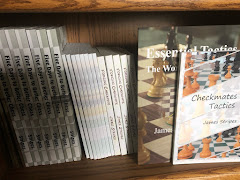In the seventeenth game of their first match, Alexander McDonnell overlooked the strength of his opponent's sacrificial attack. McDonnell (1798-1835) was born in Belfast, Ireland. He spent some time in the West Indies and then served as Secretary to a London group of merchants engaged in West Indies trade. He played chess in his spare time. By the early 1830s, he achieved recognition as the strongest player in England.
Louis-Charles Mahé de La Bourdonnais (1795-1840), was the "undisputed champion of France" from 1822, according to David Hooper and Kenneth Whyld (The Oxford Companion to Chess [1996], 56). Hooper and Whyld note that France was the "home of the world's strongest chess players."
Prior to 1851, there were no international tournaments organized. Occasional matches took place between players with reputations as strong players, but most of their games were not recorded. Play at odds was common and most games were played for a stake. When La Bourdonnais crossed the English channel to visit London and contest a series of games against McDonnell, a new era in chess was born. Because their games were recorded and later published by William Greenwood Walker, they were studied by all top players through the next several decades.
Earlier this summer, I began working through all available games of McDonnell. Of his 110 games in the ChessBase database, 85 were against La Bourdonnais. I am slowly working through the games in their six matches, blogging each game. As I go through them, I am employing only minimal research into the opinions of other commentators on the games. I am wholly avoiding use of chess analysis engines to check my own calculations.
Studying these games in this manner should strengthen my positional and tactical skills, may develop my skills as an analyst, and offers my readers glimpses into my growing understanding of an important period in chess history. My series begins with "Three Fighting Draws". Following the links in each post permits the interested reader to go through the whole series in sequence. "Strong Knights," posted yesterday, concerns game 16 in the first match.
De Labourdonnais,Louis Charles Mahe -- McDonnell,Alexander [D20]
London m1 London (17), 1834
1.d4 d5 2.c4 dxc4 3.e3 e5 4.Bxc4 exd4 5.exd4 Nf6 6.Nc3 Be7 7.Nf3 0–0 8.Be3
La Bourdonnais played this move only in this one game. Few others have tried it since. In other games, he tried 8.h3 and 8.0–0
Black to move
8...c6
As in game 15, I prefer 8...Nbd7.
9.h3 Nbd7 10.Bb3
10.0–0 Nb6 11.Bb3 Nbd5 12.Bg5 Be6.
10...Nb6 11.0–0 Nfd5
11...Nbd5 seems better to me.
12.a4 a5 13.Ne5 Be6 14.Bc2
Black to move
White is bringing his forces to bear on Black's kingside. How should Black defend? I would pursue a plan centered on fianchettoing the dark-squared bishop.
14...f5?!
This move was made possible by Black's 11th move, but looks to me like a weakening move. White's knight on e5 can no longer be dislodged except by Black's pieces. The bishops on the e-file could become targets.
McDonnell might have tried 14...Re8 with the idea of following with g6 and Be7-f6-g7. Play might continue 15.Ne4 (15.Qh5!? g6 16.Qf3 Bf6 17.Ne4 Bg7 18.Bg5) 15...g6 (15...Nb4 16.Bb1 N6d5) 16.Bh6 Nf6 17.Nxf6+ Bxf6 18.f4 Bg7 19.f5 Bd5 20.Bxg7 Kxg7 21.f6+ Kg8 22.Qd2 Qd6 23.Qh6 Qf8.
15.Qe2 f4 16.Bd2 Qe8
Where is the queen headed? All the light squares on Black's kingside are covered by White's pieces.
17.Rae1 Bf7 18.Qe4
Black to move
18...g6
18...Nf6!? 19.Qf5 g6 20.Qxf4
19.Bxf4 Nxf4 20.Qxf4 Bc4 21.Qh6
All of White's pieces are positioned for an assault on the Black king.
Black to move
21...Bxf1?
21...Nd5 22.Bxg6 hxg6 23.Nxg6 Kf7 24.Qh7+ Kf6 25.Ne4+ Ke6 26.Nc5+ Kd6 27.Re6+ Kc7 28.Nxf8 Qxf8 29.Rfe1 and White has an advantage, but some play remains.
22.Bxg6! hxg6 23.Nxg6 Nc8
23...Nd5 24.Nxd5 cxd5 25.Nxe7+ Qxe7 26.Rxe7 Rf7 27.Qg6+ Kh8 28.Rxf7
24.Qh8+ Kf7 25.Qh7+ Kf6
White to move
26.Nf4! Bd3
26...Qd7 27.Ne4#
27.Re6+ Kg5 28.Qh6+ Kf5 29.g4# 1–0
McDonnell misplayed his knights, which resulted in the necessity to move one or more of the pawns in front of his king. He then moved the wrong one. Finally, he grabbed material and fell to a mating attack.
The next game is discussed in "Attack and Counterattack".
The next game is discussed in "Attack and Counterattack".



















No comments:
Post a Comment